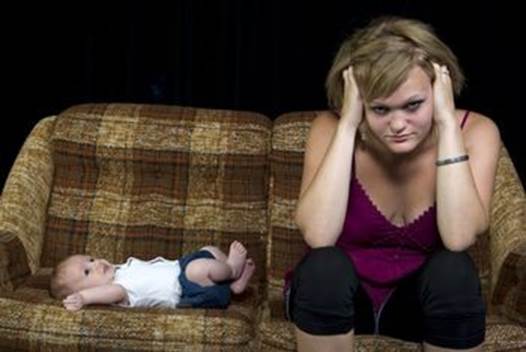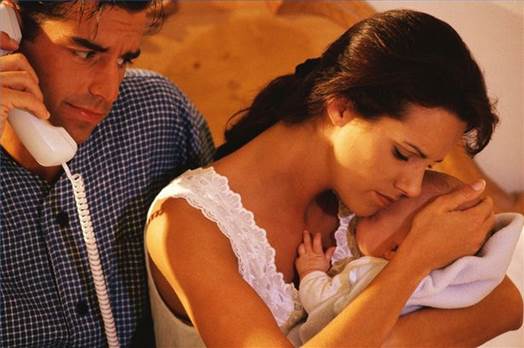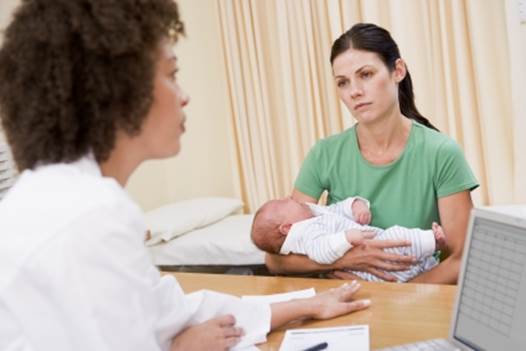Postpartum depression is the situation
relating to mother’s thoughts and the feeling of fatigue, sadness, and worry
after giving birth.
Women who have postpartum depression are
usually afraid that their children will be harmed and they are bad mothers.
Postpartum depression can be mild or
severe, and last for short or long time. It can be treated and in some cases,
it can be prevented early.

Women
who have postpartum depression are usually afraid that their children will be
harmed and they are bad mothers.
Mild postpartum depression affects mother’s
constitution such as weight loss, malnutrition; and her mentality such as
nervous breakdown, delusion, dangerous behavior. So her husband and child
cannot be cared well.
The family is not happy. Severe depressed
mothers have the thought or behavior of suicide (41.2%). Others get mental
disorder, and always have the feeling of being harmed, so they try to revenge.
Some mothers think that their children are
possessed by devil, so they try to expel evil spirit. This is very dangerous to
baby’s life. Even for other relatives in the family, some mothers may stab them
with a knife because they are paranoid of being harmed.
Causes of postpartum depression
After giving birth, decreasing estrogen and
progestrogen suddenly have parts in causing depression. Thyroid gland’s
hormones reduce quickly causing the feeling of fatigue and depression.
Changing in blood volume, blood pressure,
immune system and transformation lead to fatigue and easily change emotion.
Family contradiction, financial problem,
lack of relative’s help
Have difficult in caring the baby. Many
mothers feel stressful, insomniac, worry about caring the baby. Since then they
are tired of life and lose control of their personal lives.
Heredity factors: if there is someone in
family has depression (mother, sister, father), the risk of having depression
is high.
Treatment
Support
from relatives
Friends and family need to be sure that
depressed mothers are being treated by the doctor. If the prescription is not
appropriate, you have to encourage them to see the doctor and ask him to change
the prescription.
Their families should understand that the
disease is at temporary stage and the supports from them can help them to
recover quickly.
Don’t forget that these mothers are not
well and don’t disturb them. Try to treat her as normal. When they do not feel
well, let them rest more, and when being good, they can do anything they like.
Remember that depression is not a disease’s
symptom. A depressed mother usually does not like being lonely, so you should
try to arrange to always have someone trusted beside her.

Supports
from relatives can help the depressed mother recover quickly.
Medical
treatment
When depressed mother thinks that they have
postpartum depression, go to see doctor as soon as possible, or ask him to come
home. Try to tell the doctor in detail about all symptoms, it can help the
doctor to diagnose more exactly the disease.
Medicines prescribed are usually
tranquillizer or antidepressant. Many women find that tranquillizer is not
effective and ask to change the prescription.
Antidepressant usually makes patient have
the feeling of dried mouth and drowsiness. If the patient feels more
uncomfortable, you should take her to see the doctor to change drug, or if you
stop using medicine for weeks but having no effect, you should also see the
doctor for other drug.

When
depressed mother thinks that they have postpartum depression, go to see doctor
as soon as possible, or ask him to come home.
Besides using medicine, it is important to
maintain a healthy diet, vitamin B6 or vitamin complex should be used.
If medicine is appropriate for the patient,
do not shorten time treatment, because depression needs a long time treatment
to recover completely. If the symptoms relapse after stopping using medicine,
do not be disappointed, take her to the doctor for consultant.
Normally, doctor will continue treating
with the previous medicine. After that, if it is effective, he will reduce the
dose. It can prevent the patient from relapsing.